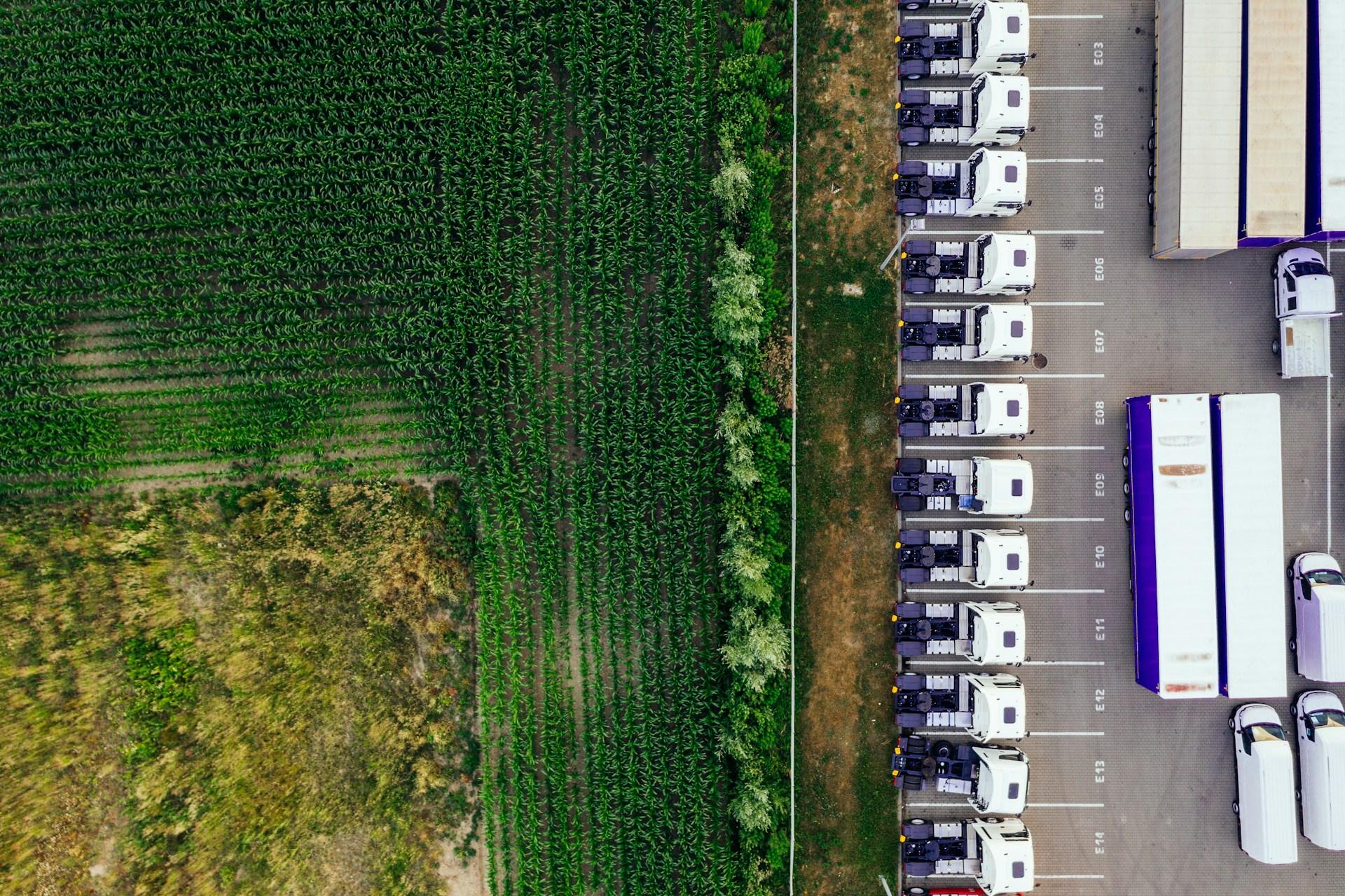The commercial logistics industry, especially within the realm of produce shipping, is rife with potential complications.
These complexities can range from perishable goods spoiling to supply chain disruptions caused by inclement weather scenarios.
It is with these potential risks in mind that businesses grapple with the crucial task of safeguarding their operations.
Insurance policies specifically tailored to the needs of produce shipping businesses become indispensable in such a context.
Ensuring adequate financial protection against a spectrum of unanticipated factors is paramount.
This blog will explore some of those critical insurance policies that increase a business’s resilience against operational uncertainties.
Contents
Essential Insurance Policies For Produce Shipping Businesses
1. Commercial Auto Insurance
Commercial Auto Insurance is an essential insurance policy that every produce shipping business should consider.
As the nature of the business involves the transportation of goods, specifically perishable items like produce, across different locations, the risks associated with vehicle damages or accidents are inevitable.
As such, having an adequately covered Commercial Auto Insurance can go a long way in offsetting the financial burdens that these unforeseen events might cause.
Commercial Auto Insurance typically offers comprehensive coverage including property damage, bodily injury, collision, and more.
It provides compensation for vehicle repair or replacement costs in the event of accidents, thefts, or natural disasters.
Moreover, if your business vehicles cause bodily injury or death to third parties during the operation, the insurance will cover the corresponding costs.
In addition, if your produce shipping vehicle collides with another vehicle or object, the collision coverage can pay for the repair or replacement costs.
Aside from this, there is also the option for businesses to opt for a coverage that protects against incidents that are not necessarily collision-related such as theft, vandalism, or natural disasters – this is known as comprehensive coverage.
Another important coverage that businesses can consider is uninsured/underinsured motorist coverage.
This coverage helps pay for your vehicle’s repairs if the person who hit your vehicle does not have adequate insurance to cover the repair costs.
Moreover, Commercial Auto Insurance can also provide protection for the goods being transported – especially beneficial for produce shipping businesses.
Depending on the specific policy, it could cover the costs required for the replacement of damaged or stolen goods.
It is crucial, however, for businesses to thoroughly review the policy before purchasing, to ensure all their specific needs are being met.
While costs can vary, generally the premiums for Commercial Auto Insurance are determined by factors such as the type of vehicle used, the goods being transported, the range of operation, and the driving records of the drivers.
A good understanding of these factors can help businesses negotiate for a more appropriate premium rate.
In summary, Commercial Auto Insurance plays a significant role in mitigating the risks associated with vehicle usage in a produce shipping business, helping businesses to protect themselves against unexpected costs and ensuring the smooth continuation of their operations.
2. General Liability Insurance
For any business, including one involved in the production and shipping of goods, having an adequate amount of general liability insurance is essential.
This type of coverage is designed to protect companies from claims that can arise from accidents, injuries, and negligence amongst other things.
One major benefit of general liability insurance is that it covers bodily injury.
By having general liability insurance, a business can be assured that it has financial protection in place against unforeseen lawsuits or claims due to accidents on business property or due to the company’s operations.
Potentially, a worker could suffer an injury while handling your produce, or a customer could slip and fall while visiting your facilities, leading to substantial medical bills and potentially, lawsuits.
General liability insurance also covers any property damage that your business might inadvertently cause.
Another important aspect of general liability coverage is that it covers potential damage to a third party’s property due to your business operations or products.
Suppose you transport produce in a reefer and the unit ends up causing damage to a client’s property, general liability insurance kicks in to cover those costs.
In addition, general liability insurance can provide businesses with protection against claims of false advertising, slander, and libel.
In the produce shipping business, where reputation is everything, having a policy in place to cover such claims can prove invaluable.
It’s also worth noting that general liability insurance is not a one-size-fits-all policy.
Each produce shipping business is likely to need different levels of coverage based on factors like the size of their operations, the types of products they handle, and the overall risk factors involved in their work.
A crucial aspect of general liability insurance is that it is not mandated by law, but it’s highly recommended for all businesses.
By having adequate general liability insurance, a produce shipping company not only helps protect its business assets but also secures its financial future.
Remember, a single lawsuit or claim, without proper insurance, could financially devastate a small business; therefore, it’s always better to be over-prepared than underprepared.
Therefore, general liability insurance policy should be considered essential for every produce shipping business.
3. Workers Compensation Insurance
Workers Compensation Insurance plays an integral role in any operation, but it is particularly essential for produce shipping businesses.
In the event that an employee gets injured or becomes ill at work, this coverage is designed to safeguard both the employee and the employer.
The workers’ compensation insurance typically covers medical costs and wage replacement for the injured worker.
Produce shipping businesses are inherently risky, given the nature of tasks involved, including heavy lifting and hours of driving.
This exposes employees to potential health risks and injuries, making this insurance policy an absolute necessity.
Without sufficent coverage, a business might face expensive legal battles, hefty medical bills, and costly settlements that could significantly affect its financial health and operation.
Moreover, most states mandate employers to have workers’ compensation insurance, failing to comply with these regulations can result in severe penalties and fines.
This mandatory requirement is designed to protect workers, but it also mitigates the liabilities of business owners.
It’s worth noting that, for a business as physically demanding as produce shipping, the cost of workers’ compensation insurance is usually high.
However, the financial safeguards it offers far outweigh the expense, making it a worthwhile investment.
Furthermore, having a solid workers’ compensation insurance also appeals to potential employees as it implies that the company values the safety and wellbeing of their workforce.
The coverage can also be tailored to accommodate the specific needs and risks of your produce shipping business.
It’s also worth consulting with a professional insurance broker, who can help in assessing the level of risk associated with your business and guide you in finding the most adequate coverage.
In sum, workers’ compensation insurance is not only required by law but is key to protecting your business from financial woes while ensuring the well-being of your employees.
Investing in comprehensive workers’ compensation coverage will undoubtedly pay off in the long run.
4. Product Liability Insurance
Product liability insurance is a type of insurance cover that provides protection to businesses against claims brought about due to damages caused by their products.
For produce shipping businesses, this type of insurance is exceptionally crucial as it forms a significant part of their risk management strategy.
Products in the produce shipping industry can include a vast range of items such as fresh fruits, vegetables, dairy products, and poultry among others.
These products are susceptible to various risks during transportation which may result in their spoilage or damage.
When such incidences occur, the affected parties might decide to seek compensation by filing legal suits against your business.
Without product liability insurance, you might have to cover the costs resulting from these lawsuits out of your pocket, which can jeopardize your business financially.
Product liability insurance comes into play by offering financial coverage for such liabilities.
It will pay for the legal fees, costs of investigation, judgments, or settlements up to the limit of the policy.
Therefore, having this insurance can provide significant financial relief to your business in the wake of product liability claims.
It is also worth noting that product liability laws may vary significantly depending on your location.
For instance, some jurisdictions may hold the manufacturer liable for product defects while others may extend this liability to all parties involved in the distribution chain.
This is why it’s important to consult with an experienced insurance agent or broker to help you understand the specific product liability laws applicable in your area.
This knowledge is critical in ensuring that your business purchases the most appropriate product liability insurance cover.
The cost of product liability insurance is typically based on the perceived risk associated with your products, quantity shipped, safety measures in place, as well as your claims history among other factors.
In a nutshell, having product liability insurance is essential for legal and financial protection in the produce shipping business.
By considering this policy, you can confidently carry on with your business operations knowing that you’re shielded from potentially crippling losses resulting from product damages or defects.
5. Cargo Insurance
One vital aspect of running a successful produce shipping business is ensuring you have adequate cargo insurance.
This type of insurance is designed to cover the damage or loss of goods while they are in transit.
Purchasing cargo insurance is an essential step in the protection of your business’ assets.
Without cargo insurance, your business could face substantial financial losses in the event of an accident, theft, or other unforeseeable circumstances.
The value of your goods, exposures related to specific types of transport, and international risk considerations can all determine the level of coverage needed.
Understanding the intricacies of cargo insurance and investing in the right policy can ensure that your produce transportation business is adequately protected.
Having the right insurance in place can give you peace of mind, knowing that your goods are protected against unplanned incidents affecting your bottom line.
Claims against cargo insurance can be made in situations such as the loss or damage of goods during transportation, contamination resulting from an accident, or even instances of theft.
Cargo insurance policies usually cover risks at all stages of the transportation process, from the warehouse to the final delivery point.
Policies can differ in terms of whether they cover goods being transported nationally or internationally, and whether coverage applies to transport by road, sea, air, or rail.
One critical consideration in choosing the right policy is understanding the terms and conditions, as they can affect how insurance companies will respond to a claim.
Working with an experienced insurance broker can help you navigate the complexities of cargo insurance.
They can help customise a policy that fits your specific business needs, taking into account the types of produce you transport and the routes you use most frequently.
This can help to minimise your risk exposure and ensure that your business can continue to operate and profit, even if an accident or theft occurs.
In addition to providing a financial safety net, having cargo insurance can also improve your reputation among clients as a reliable and trustworthy partner in the produce shipping industry.
Overall, investing in cargo insurance is a critical factor in protecting the financial health and sustainability of your produce shipping business.
The Bottom Line
Businesses dealing in a range of sectors must ensure they are appropriately covered against potential risks and unforeseen incidents.
Key insurance types such as Commercial Auto, General Liability, Workers Compensation, Product Liability, and Cargo Insurance provide necessary financial protection.
These policies foster a safety net, protecting companies from significant loss, should an accident, injury, or product-related incident occur.
Implementing these types of insurances ensures the longevity of your business, reinforces credibility among partners and clients, and aligns with legal obligations.
Ultimately, being adequately insured not only signifies responsible business management but also safeguards the future of the enterprise.




